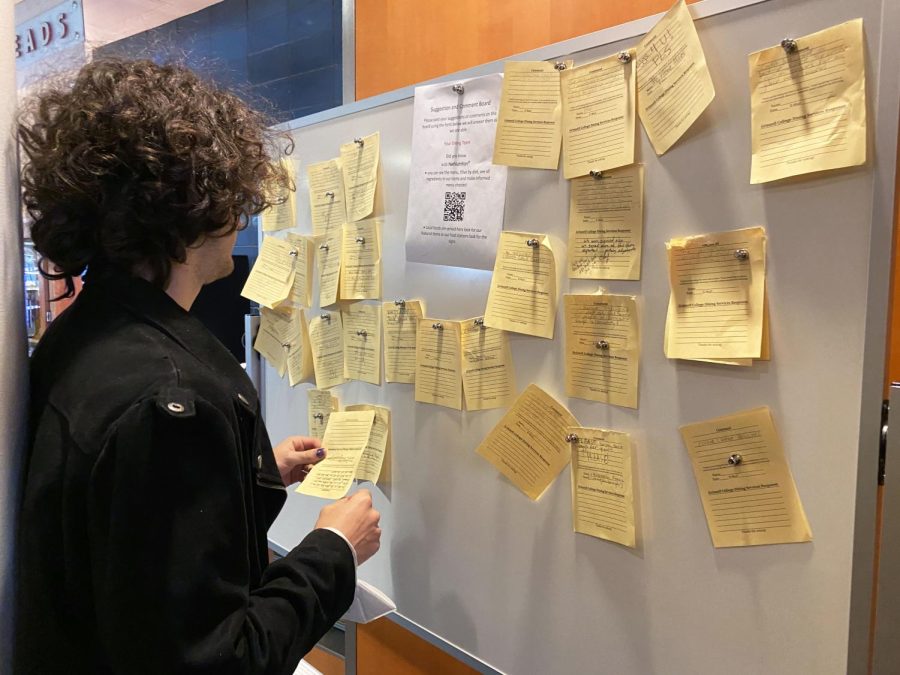Dining revamps operations as past problems persist and new frustrations arise
Jasper Gray `24 contacted Dining Services multiple times regarding issues with the gluten-free dining options.
September 26, 2022
The Grinnell College Dining Hall has reopened the stir fry station and hired additional staff, as concerns over their practices and notes on their comment board piled up.
During the last school year, the Dining Hall experienced health code violations, received allegations of lacking dietary accommodations and faced severe understaffing, forcing it to close stations and ask student workers to take on more responsibilities.
How has the Dining Hall addressed the issues from last year?
Grayson Towne-Colley `24, a student worker at the Dining Hall, said that while the understaffing problem has improved, it has not been completely eradicated.
Towne-Colley also said that a lot of the additional staff that have been hired are non-student workers. Mattia Wells, senior content strategist and media relations, said in an email to the S&B that students no longer sign up for shifts on specific stations. Rather, they sign up for “Front of House” and “Back of House” shifts — allowing for greater flexibility to meet the needs of the Dining Hall.
In addition to the understaffing problem, the Dining Hall was cited with five different health code violations, including low temperatures maintained in the salad bar and expired food stored in a refrigerator, by the Iowa Department of Inspections & Appeals on April 29 of this year.
Wells said that the Dining Hall corrected these violations immediately after they were issued and was thus not under a real threat to be shut down.
Wells also said that all full-time Dining Hall staff have been trained in all aspects of the Iowa Food Code using the ServSafe Management program which grants a certification that lasts five years. Staff are required to retake the test before it expires.
Wells explained that the temperatures of food, sanitizing solutions and dish washers are all recorded and logged. When items are not up to standard, such as having an improper temperature or being cross-contaminated, the item is disposed of, and a supervisor is informed.
Concerns from student athletes and students with dietary restrictions:
The S&B spoke to students with dietary restrictions who expressed concerns with the way the Dining Hall runs the gluten-free and vegan stations.
Noah Joseph `23 said that there may be a potential cross-contamination problem in the Dining
Hall. He has celiac disease and often has gastrointestinal problems after eating at the Dining Hall, a problem he said happens significantly less frequently when he is back home.
Wells said that the Dining Hall has put up signs to help increase awareness and hopefully decrease cross-contamination between stations.
Joseph said that he believes this is insufficient as he doubts many people read the signs, especially if they are in a hurry.
Jasper Gray `24 said they find the variety and quality of gluten-free food in the Dining Hall to be below standard. “We’re just tired of dry chicken and rice,” Gray said.
Gray also said that the food usually has been out for a while by the time they get it.
Both Gray and Joseph said that depending on the time they get to the Dining Hall, there may not be much, if any, food left.
“I think that the main issue is that they just need to pay attention. And if food is stale, then I don’t think that [they] should leave it out,” said Gray, referring to Dining Services.
Anika Sheth `26 said the vegan station also struggles with the availability, quality and variety of the
food. She added that it is worse for her given that she has many different food allergies which makes finding food that she can eat difficult for her.
Nichole Henning `26 said that often when she gets to the Dining Hall from tennis practice, there is very little food left, with little variety. She also said that her practices often end after the Dining Hall closes.
Wells said that this is a new concern and that the Dining Hall was under the impression that student athletes would be able to make it to the dinner service on time. She also said that Dining Services packaged food for athletes that were unable to make it to the dinner service after fall break 2021, and they may start doing so again after fall break of this year.
In response to this possibility, Sheth, who is also on the tennis team said, “I think it can be very beneficial, but for tennis, we’re done after fall break until the spring, so by then it’s too late.”
“As soon as I get more space and I have the ability to have a kitchen and cook, I’m absolutely taking myself off the meal plan because it’s not dependable,” Sheth said.
Expressing concerns to the Dining Hall:
Gray said they put a comment including concerns over the lack of gluten-free options and included their email on the comment board by the Dining Hall exit during lunch service on Sept. 13. Gray said that the comment was taken down within 24 hours of being posted while older comments were still left on the board.
Wells said that the Dining Hall reviews the comments on the board daily and responds to them as soon as possible.
The Dining Hall did not respond to Gray’s comment until Sept. 21, over a week after it was posted, and after the S&B inquired about the comment board.
Britt McConnell, consultant dietician, responded to Gray via email and acknowledged that they had increased the number of gluten-free and vegan options in response to student concerns, including stocking the medical diet cooler.
Sheth said that one of the reasons she chose the College was due to how accommodating they assured the Dining Hall was towards dietary restrictions.
“To hear that students are not getting the accommodations that they need in order to eat a proper meal, something that is essential for your survival, is concerning to say the least,” Sheth said.







































































